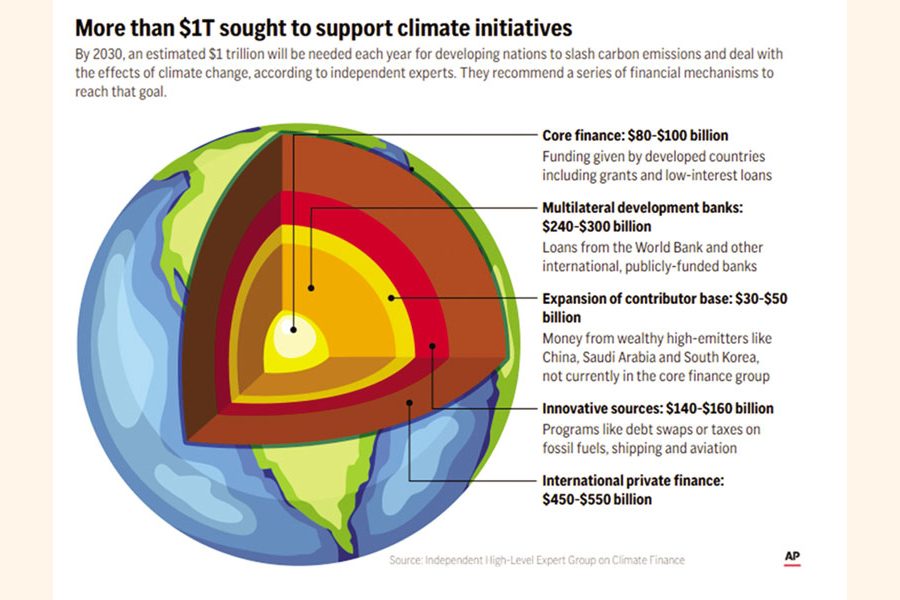
Published :
Updated :

The 29th UN Climate Conference (COP29) ended in Baku, Azerbaijan (on November 23, 2024) with a sense of 'dissatisfaction and betrayal'. Earlier delegates from 200 countries of the world with more than 100 heads of states gathered in Baku on November 11, 2024 at the UN Climate Summit with the hope that global leaders would find effective ways to restrict global warming within 1.5 °c above preindustrial levels, mobilise finance necessary for poor countries to mitigate impacts of global warming, and assist people adapt with the sufferings due to climate change impacts.
Despite expectations for annual allocation of $1 (one) trillion dollars, delegates of the COP29 left the conference venue only with the promises for a total of US$ 300 billion from the budgetary allocations of the industrially developed countries and the public financial institutions like the World Bank for the global climate fund. The promised funds are expected to be mobilised from 'a wide variety of sources including public and private, bilateral and multilateral and alternative sources'. A large part of the related complex issues and challenges including 'transition away from fossil fuel', 'new collective quantified goals (NCQG)' for climate finance ( to be agreed) have not been finalised, rather pushed for discussion next year at COP30 Summit scheduled to take place in Brazil. Developed countries explain their budgetary limitations to offer more for global climate funds. The developing poor countries who became major victims of climate change need at least one trillion dollars annually in climate finance by 2030 to mitigate climate change impacts and to shift to low carbon economy and to adapt their infrastructures and livelihood with the climate change impacts.
Earlier UN Climate Summit agreed that the mitigation of nationally determined contributions (NDC) for Green House Gas (GHG) emission (submitted by the UN member countries) alone would require US$ 5.8 trillion dollars within 2030. Bangladesh, in its NDC document submitted to the UN, reports that it will require US$12.5 billion minimum annually to reduce GHG emission through mitigation measures and for realising adaptation initiatives. Bangladesh is the victim of extreme climate change. However, its contribution of GHG emission in the atmosphere is negligible, (Bangladesh contributes less than 0.5 per cent of total global GHG emission). Bangladesh has recorded its aims to reduce 6.73 per cent GHG emission (without external financial support) and pledges to achieve additional 15.12 per cent GHG emission reduction with global supports.
The Paris UN Climate Conference (2015) agreed that the rich countries of the world had obligations to the poor and climate-vulnerable countries to render financial support to cope with the global climate change impacts. Climate change has been devastating the economy of the poor countries. Delays in climate finance would delay in restricting GHG emission in the atmosphere and deepen crisis for everyone.
The US think-tank, the Centre for Climate and Energy Solutions considers that approximately $3.5 trillion dollar investment will be required annually between now and 2050 to enable scientific shift from the present fossil fuel dominated world to a low carbon, low waste, and more productive and healthier energy systems of the world. For the developed countries, the task is relatively straightforward, switching from the dirty and polluting infrastructure to low carbon technologies. On the contrary, for the developing poor countries the challenges are complicated. They need huge investment to elevate poverty of their people, fund basic services and develop clean and productive industries and infrastructure, and secure sustainable economic growth. Moreover, devastating impacts of climate change are thinning their development gains. Developing countries have been explaining their limitations and challenges and for the urgent needs for sufficient and easier climate funding. The Guardian reports (Nov 8, 2024) that the UN Climate Chief Simon Stiell considers that no economy including G20 will survive unchecked global heating and no household will be spared its severe inflammatory impacts unless all countries cut emissions and build more resilience into global supply chains.
Bangladesh will require investment of around US$ 3.5 billion within 2030 to attain renewable energy infrastructure development and energy efficiency targets commensurate with the targets for GHG emission reduction. Advancing the country's green energy transition is vital for ensuring energy security, sustainable development and economic resilience.
Mushfiqur Rahman is a mining engineer. He writes on energy and environment issues.
mushfiq41@yahoo.com


 For all latest news, follow The Financial Express Google News channel.
For all latest news, follow The Financial Express Google News channel.